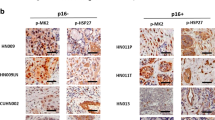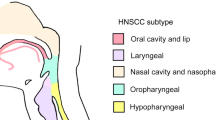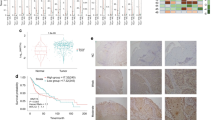Abstract
The molecular mechanisms that contribute to the initiation and progression of head and neck squamous cell carcinoma (HNSCC) have not been completely delineated. Our observations indicate that defects in the transforming growth factor-β and PI3K/Akt signaling pathways are common in human HNSCCs. Conditional activation of the PI3K/Akt pathway due to Pten deletion in the mouse head and neck epithelia gives rise to hyperproliferation, but only a few lesions progress to HNSCC. However, Pten-deficient mice developed full-penetrance HNSCC in combination with type I TGF-β receptor (Tgfbr1) deletion. Molecular analysis revealed enhanced cell proliferation, decreased apoptosis, and increased expression of CCND1 in the basal layer of the head and neck epithelia, as well as in the tumors of Tgfbr1/Pten double conditional knockout (2cKO) mice. Furthermore, neoplastic transformation involves senescence evasion, and is associated with an increased number of putative cancer stem cells. In addition, the nuclear factor-κB pathway activation, myeloid-derived suppressor cell infiltration, angiogenesis and immune suppression in the tumor microenvironment, all of which are characteristics of human HNSCCs, contribute significantly to head and neck carcinogenesis in 2cKO mice. These tumors display pathology and multiple molecular alterations resembling human HNSCCs. This suggests that the Tgfbr1/Pten 2cKO mouse model is suitable for preclinical intervention, and that it has significant implications in the development of diagnostic cancer biomarkers and effective strategies for prevention and treatment of HNSCCs.
This is a preview of subscription content, access via your institution
Access options
Subscribe to this journal
Receive 50 print issues and online access
$259.00 per year
only $5.18 per issue
Buy this article
- Purchase on Springer Link
- Instant access to full article PDF
Prices may be subject to local taxes which are calculated during checkout






Similar content being viewed by others
References
Bian Y, Terse A, Du J, Hall B, Molinolo A, Zhang P et al. (2009). Progressive tumor formation in mice with conditional deletion of TGF-beta signaling in head and neck epithelia is associated with activation of the PI3K/Akt pathway. Cancer Res 69: 5918–5926.
Bierie B, Moses HL . (2006). Tumour microenvironment: TGF-beta: the molecular Jekyll and Hyde of cancer. Nat Rev Cancer 6: 506–520.
Bierie B, Stover DG, Abel TW, Chytil A, Gorska AE, Aakre M et al. (2008). Transforming growth factor-beta regulates mammary carcinoma cell survival and interaction with the adjacent microenvironment. Cancer Res 68: 1809–1819.
Bornstein S, White R, Malkoski S, Oka M, Han G, Cleaver T et al. (2009). Smad4 loss in mice causes spontaneous head and neck cancer with increased genomic instability and inflammation. J Clin Invest 119: 3408–3419.
Chen T, Yan W, Wells RG, Rimm DL, McNiff J, Leffell D et al. (2001). Novel inactivating mutations of transforming growth factor-beta type I receptor gene in head-and-neck cancer metastases. Int J Cancer 93: 653–661.
Chen Z, Trotman LC, Shaffer D, Lin HK, Dotan ZA, Niki M et al. (2005). Crucial role of p53-dependent cellular senescence in suppression of Pten-deficient tumorigenesis. Nature 436: 725–730.
Chen ZG . (2009). The cancer stem cell concept in progression of head and neck cancer. J Oncol 894064. Epub 2009 Dec 3.
Cohen J, Chen Z, Lu SL, Yang XP, Arun P, Ehsanian R et al. (2009). Attenuated transforming growth factor beta signaling promotes nuclear factor-kappaB activation in head and neck cancer. Cancer Res 69: 3415–3424.
Conery AR, Cao Y, Thompson EA, Townsend Jr CM, Ko TC, Luo K . (2004). Akt interacts directly with Smad3 to regulate the sensitivity to TGF-beta induced apoptosis. Nat Cell Biol 6: 366–372.
Curado MP, Hashibe M . (2009). Recent changes in the epidemiology of head and neck cancer. Curr Opin Oncol 21: 194–200.
De Wever O, Mareel M . (2003). Role of tissue stroma in cancer cell invasion. J Pathol 200: 429–447.
Derynck R, Zhang YE . (2003). Smad-dependent and Smad-independent pathways in TGF-beta family signaling. Nature 425: 577–584.
Deshpande AM, Wong DT . (2008). Molecular mechanisms of head and neck cancer. Expert Rev Anticancer Ther 8: 799–809.
Engle SJ, Hoying JB, Boivin GP, Ormsby I, Gartside PS, Doetschman T . (1999). Transforming growth factor β1 suppresses nonmetastatic colon cancer at an early stage of tumorigenesis. Cancer Res 59: 3379–3386.
Guttridge DC, Albanese C, Reuther JY, Pestell RG, Baldwin Jr AS . (1999). NF-kappaB controls cell growth and differentiation through transcriptional regulation of cyclin D1. Mol Cell Biol 19: 5785–5799.
Henderson YC, Wang E, Clayman GL . (1998). Genotypic analysis of tumor suppressor genes PTEN/MMAC1 and p53 in head and neck squamous cell carcinomas. Laryngoscope 108: 1553–1556.
Huang B, Pan PY, Li Q, Sato AI, Levy DE, Bromberg J et al. (2006). Gr-1+CD115+ immature myeloid suppressor cells mediate the development of tumor-induced T regulatory cells and T-cell anergy in tumor-bearing host. Cancer Res 66: 1123–1131.
Jemal A, Siegel R, Xu J, Ward E . (2010). Cancer statistics, 2010. CA Cancer J Clin 59: 225–249.
Kim JS, Lee C, Bonifant CL, Ressom H, Waldman T . (2007). Activation of p53-dependent growth suppression in human cells by mutations in PTEN or PIK3CA. Mol Cell Biol 27: 662–677.
Kusmartsev S, Nagaraj S, Gabrilovich DI . (2005). Tumor associated CD8+ T cell tolerance induced by bone marrow-derived immature myeloid cells. J Immunol 175: 4583–4592.
Lee JI, Soria JC, Hassan KA, El-Naggar AK, Tang X, Liu DD et al. (2001). Loss of PTEN expression as a prognostic marker for tongue cancer. Arch Otolaryngol Head Neck Surg 127: 1441–1445.
Lee JY, Kang MB, Jang SH, Qian T, Kim HJ, Kim CH et al. (2009). Id-1 activates Akt-mediated Wnt signaling and p27(Kip1) phosphorylation through PTEN inhibition. Oncogene 28: 824–831.
Levy L, Hill CS . (2006). Alterations in components of the TGF-beta superfamily signaling pathways in human cancer. Cytokine Growth Factor Rev 17: 41–58.
Licitra L, Perrone F, Bossi P, Suardi S, Mariani L, Artusi R et al. (2006). High-risk human papillomavirus affects prognosis in patients with surgically treated oropharyngeal squamous cell carcinoma. J Clin Oncol 24: 5630–5636.
Loercher A, Lee TL, Ricker JL, Howard A, Geoghegen J, Chen Z et al. (2004). Nuclear factor-kappaB is an important modulator of the altered gene expression profile and malignant phenotype in squamous cell carcinoma. Cancer Res 64: 6511–6523.
Lu SL, Herrington H, Reh D, Weber S, Bornstein S, Wang D et al. (2006). Loss of transforming growth factor-beta type II receptor promotes metastatic head-and-neck squamous cell carcinoma. Genes Dev 20: 1331–1342.
Lu SL, Reh D, Li AG, Woods J, Corless CL, Kulesz-Martin M et al. (2004). Overexpression of transforming growth factor beta1 in head and neck epithelia results in inflammation, angiogenesis, and epithelial hyperproliferation. Cancer Res 64: 4405–4410.
Mao L, Hong WK, Papadimitrakopoulou VA . (2004). Focus on head and neck cancer. Cancer Cell 5: 311–316.
Massagué J . (2008). TGF-β in Cancer. Cell 134: 215–230.
Massagué J, Gomis RR . (2006). The logic of TGF-β signaling. FEBS Lett 580: 2811–2820.
Molinolo AA, Amornphimoltham P, Squarize CH, Castilho RM, Patel V, Gutkind JS . (2009). Dysregulated molecular networks in head and neck carcinogenesis. Oral Oncol 45: 324–334.
Moral M, Segrelles C, Lara MF, Martínez-Cruz AB, Lorz C, Santos M et al. (2009). Akt activation synergizes with Trp53 loss in oral epithelium to produce a novel mouse model for head and neck squamous cell carcinoma. Cancer Res 69: 1099–1108.
Moustakas A, Heldin CH . (2009). The regulation of TGF-β signal transduction. Development 136: 3699–3714.
Pasche B, Knobloch TJ, Bian Y, Liu J, Phukan S, Rosman D et al. (2005). Somatic acquisition and signaling of TGFBR1*6A in cancer. JAMA 294: 1634–1646.
Pedrero JM, Carracedo DG, Pinto CM, Zapatero AH, Rodrigo JP, Nieto CS et al. (2005). Frequent genetic and biochemical alterations of the PI 3-K/AKT/PTEN pathway in head and neck squamous cell carcinoma. Int J Cancer 114: 242–248.
Piek E, Roberts AB . (2001). Suppressor and oncogenic roles of transforming growth factor-beta and its signaling pathways in tumorigenesis. Adv Cancer Res 83: 1–54.
Prince ME, Sivanandan R, Kaczorowski A, Wolf GT, Kaplan MJ, Dalerba P et al. (2007). Identification of a subpopulation of cells with cancer stem cell properties in head and neck squamous cell carcinoma. Proc Natl Acad Sci USA 104: 973–978.
Remy I, Montmarquette A, Michnick SW . (2004). PKB/Akt modulates TGF-beta signalling through a direct interaction with Smad3. Nat Cell Biol 6: 358–365.
Rocco JW, Leong CO, Kuperwasser N, DeYoung MP, Ellisen LW . (2006). p63 mediates survival in squamous cell carcinoma by suppression of p73-dependent apoptosis. Cancer Cell 9: 45–56.
Shao X, Tandon R, Samara G, Kanki H, Yano H, Close LG et al. (1998). Mutational analysis of the PTEN gene in head and neck squamous cell carcinoma. Int J Cancer 77: 684–688.
Squarize CH, Castilho RM, Gutkind JS . (2008). Chemoprevention and treatment of experimental Cowden's disease by mTOR inhibition with rapamycin. Cancer Res 68: 7066–7072.
Swarbrick A, Roy E, Allen T, Bishop JM . (2008). Id1 cooperates with oncogenic Ras to induce metastatic mammary carcinoma by subversion of the cellular senescence response. Proc Natl Acad Sci USA 105: 5402–5407.
Tang B, Vu M, Booker T, Santner SJ, Miller FR, Anver MR et al. (2003). TGF-beta switches from tumor suppressor to prometastatic factor in a model of breast cancer progression. J Clin Invest 112: 1116–1124.
Tang B, Yoo N, Vu M, Mamura M, Nam JS, Ooshima A et al. (2007). Transforming growth factor-beta can suppress tumorigenesis through effects on the putative cancer stem or early progenitor cell and committed progeny in a breast cancer xenograft model. Cancer Res 67: 8643–8652.
Vijayachandra K, Higgins W, Lee J, Glick A . (2009). Induction of p16ink4a and p19ARF by TGFbeta1 contributes to growth arrest and senescence response in mouse keratinocytes. Mol Carcinog 48: 181–186.
Wakefield LM, Roberts AB . (2002). TGF-beta signaling: positive and negative effects on tumorigenesis. Curr Opin Genet Dev 12: 22–29.
Wang J, Yang L, Yang J, Kuropatwinski K, Wang W, Liu XQ et al. (2008). Transforming growth factor beta induces apoptosis through repressing the phosphoinositide 3-kinase/AKT7sol;surviving pathway in colon cancer cells. Cancer Res 68: 3152–3160.
White RA, Malkoski SP, Wang XJ . (2010). TGF-β signaling in head and neck squamous cell carcinoma. Oncogene 29: 5437–5446.
Xie W, Bharathy S, Kim D, Haffty BG, Rimm DL, Reiss M . (2003). Frequent alterations of Smad signaling in human head and neck squamous cell carcinomas: a tissue microarray analysis. Oncol Res 14: 61–73.
Yang L, Pang Y, Moses HL . (2010). TGF-beta and immune cells: an important regulatory axis in the tumor microenvironment and progression. Trends Immunol 31: 220–227.
Zhang YE . (2009). Non-Smad pathways in TGF- β signaling. Cell Res 19: 128–139.
Acknowledgements
We would like to thank Dr Stefan Karlsson for providing us with the Tgfbr1 flox mice, Drs Raj Puri and Lalage Wakefield for critical reading of the manuscript, Drs Juan Du, Ping Zhang, Zhong Chen and Anita Terse for technical help, and Shelagh Johnson for the expert editorial assistance. This work was supported by the Divisions of Intramural Research, National Institute of Dental and Craniofacial Research (Z01-DE-000698), and National Institute on Deafness and Communication Disorders (ZIA-DC-000073), NIH.
Author information
Authors and Affiliations
Corresponding author
Ethics declarations
Competing interests
The authors declare no conflict of interest.
Additional information
Supplementary Information accompanies the paper on the Oncogene website
Supplementary information
Rights and permissions
About this article
Cite this article
Bian, Y., Hall, B., Sun, ZJ. et al. Loss of TGF-β signaling and PTEN promotes head and neck squamous cell carcinoma through cellular senescence evasion and cancer-related inflammation. Oncogene 31, 3322–3332 (2012). https://doi.org/10.1038/onc.2011.494
Received:
Revised:
Accepted:
Published:
Issue Date:
DOI: https://doi.org/10.1038/onc.2011.494
Keywords
This article is cited by
-
Inducible TgfbR1 and Pten deletion in a model of tongue carcinogenesis and chemoprevention
Cancer Gene Therapy (2023)
-
Pan-cancer genomic analysis shows hemizygous PTEN loss tumors are associated with immune evasion and poor outcome
Scientific Reports (2023)
-
Genetically engineered mouse models of head and neck cancers
Oncogene (2023)
-
NLRP3 in tumor-associated macrophages predicts a poor prognosis and promotes tumor growth in head and neck squamous cell carcinoma
Cancer Immunology, Immunotherapy (2023)
-
Gelatinase-sensitive nanoparticles loaded with photosensitizer and STAT3 inhibitor for cancer photothermal therapy and immunotherapy
Journal of Nanobiotechnology (2021)



